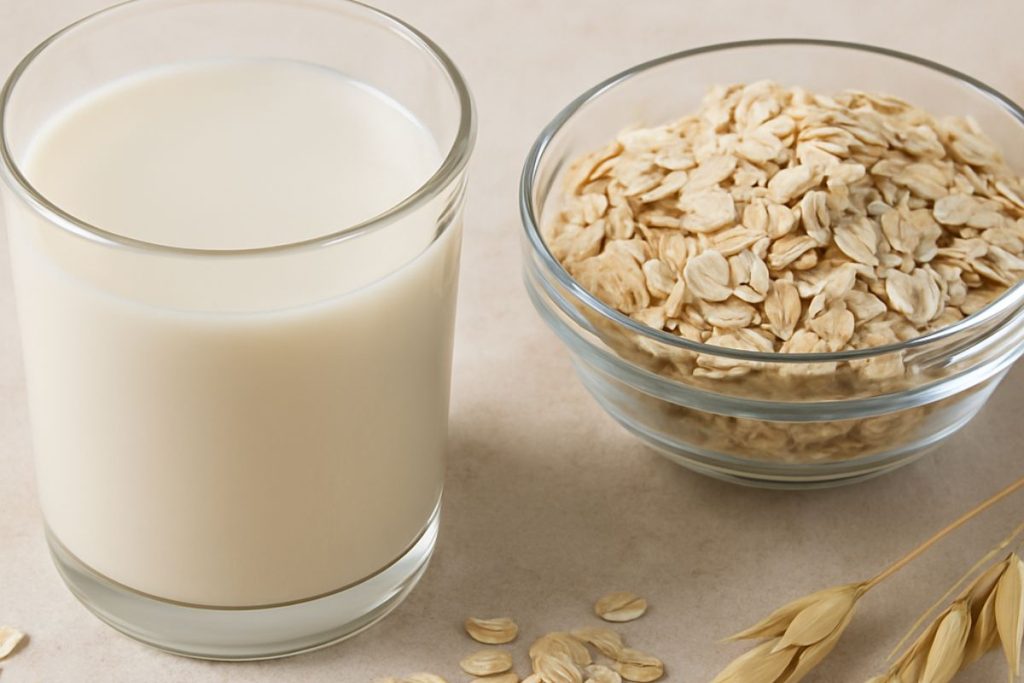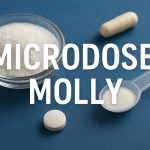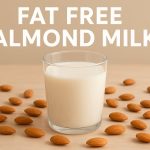Oat milk has surged in popularity over the last decade. It’s now one of the fastest growing plant milks, with oat milk sales skyrocketing as more people seek dairy free alternatives. Consumers love its creamy, neutral flavor that works in coffee, tea, and baking. The trend is driven by both health and environmental concerns: oats need far less water and land than dairy or almond production. According to market analysts, oat milk is now the second best selling plant milk in the U.S.
Unsweetened oat milk is simply oat milk made without any sweeteners. It is produced by blending oats with water (often with a little oil and salt) and then straining out the solids. The result is a lightly sweet, dairy free beverage the sweetness comes only from the natural oat starches, not cane sugar or syrups. Because it contains only oats and water, unsweetened oat milk has a clean ingredient list. A typical carton might list water, oats, a little sunflower or canola oil for texture, salt, and added vitamins/minerals. This enzymatic process can release a bit of natural oat sugar, giving it mild sweetness even without any added cane sugar.
Many unsweetened oat milks are fortified to boost nutrition. For example, Oatly’s unsweetened oat milk includes added calcium (~320mg, ~25% DV per cup) and vitamins D and B12. Planet Oat’s Unsweetened Original also highlights calcium and vitamins A & D on its label. In other words, drinking unsweetened oat milk can provide similar nutrients to cow’s milk, even without the sugar.
Oat milk is also praised for its fiber. Whole oats contain beta glucan, a soluble fiber known to help lower LDL cholesterol. Each cup of oat milk contains a bit of this fiber (often 1-3g, depending on the brand). The fiber in oat milk helps you feel fuller and supports digestive health. In fact, one review notes oat milk has among the highest fiber content of all plant based milks, making it stand out for satiety and heart health.
Figure: Jar of unsweetened oat milk with raw oats. Unsweetened oat milk is a plant based, lactose free alternative made from oats without any added sugar.
Unsweetened oat milk tastes slightly sweet and creamy because of the oat starches, even though it has no added sugar. For example, Planet Oat Unsweetened Original contains 0g sugar and just 45 calories per cup. Oatly’s Unsweetened Oat Drink (Original) has about 40 calories and 0g added sugar. By contrast, sweetened oat milks might contain 6-12g of added sugar (adding 25-50 extra calories). With unsweetened oat milk, the only sugars present are the natural oat sugars.
4 Key Benefits of Unsweetened Oat Milk
Unsweetened oat milk has several notable health and lifestyle benefits:
- No Added Sugar & Lower Calories: Without any added sweeteners, unsweetened oat milk has 0g added sugar. This means far fewer calories than sweetened milks. For instance, Planet Oat Unsweetened is 45 calories per cup, while a sweetened version of oat milk could be 25-50 cal higher. Reducing added sugar helps with weight management and blood sugar control, and it’s gentler on teeth and insulin levels.
- Heart-Healthy Fiber: Oat milk contains soluble fiber (beta-glucan) from whole oats, which can help lower cholesterol and improve heart health. This fiber makes you feel full longer and stabilizes blood sugar. Diets rich in oats and fiber are linked to reduced heart disease risk, so unsweetened oat milk can contribute to that benefit.
- Allergy-Friendly & Nutrient-Rich: Unsweetened oat milk is naturally lactose-free, dairy-free, nut-free, and soy-free. It’s suitable for vegans and people with those allergies. It’s usually fortified: many brands add calcium, vitamin D, and B12. For example, Oatly’s unsweetened oat milk provides ~25% DV calcium and 20% DV vitamin D per cup. Planet Oat’s unsweetened milk also highlights added vitamin A and D. So you get important vitamins and minerals without the sugar.
- Eco-Friendly & Versatile: Oat milk has a much lower environmental footprint than dairy. It emits far fewer greenhouse gases and uses less water and land than cow’s milk production. Beyond being eco-friendly, unsweetened oat milk is extremely versatile. It foams beautifully in coffee and tea, and it blends well in smoothies, cereal, and cooking. You can use it anywhere you’d use dairy milk in baking, sauces, or mashed potatoes with the added bonus of a mild oat flavor.
In short, unsweetened oat milk gives you the creaminess and fiber of oats without any added sugar. It supports heart health and most dietary needs while being gentle on the planet.
Unsweetened Oat Milk Nutrition Facts
Here’s what you typically get in 1 cup (240ml) of unsweetened oat milk (exact values vary by brand):
- Calories: ~40-100. (Examples: Oatly Unsweetened ~40 cal; Planet Oat ~45 cal; Chobani Zero Sugar ~60 cal; Califia Unsweetened ~100 cal.)
- Fat: ~1-7g. (Oatly ~1.5g; Califia ~7g.) This is mostly added plant oil (sunflower/canola) and is largely unsaturated.
- Carbohydrates: ~6-10g (with 0g added sugar). These include about 1-2g natural sugars from the oats and dietary fiber. For example, Oatly’s unsweetened label shows 6g total carbs, 0g sugar.
- Fiber: ~1-3g. Oat milk contains soluble fiber (beta-glucan), which most other milks lack.
- Protein: ~1-3g (much lower than cow’s milk’s ~8g). Brands like Elmhurst may reach ~3g because they use more whole oats.
- Vitamins & Minerals: Usually fortified. For instance, one cup can provide ~320mg calcium (~25% DV) and 20% DV vitamin D, plus added B12. Many also add vitamins A/D and riboflavin.
By comparison: skim cow’s milk has 90 cal, 8g protein, 12g carbs (all lactose), 0g fiber. Unsweetened oat milk has more carbs (because of the oats) but provides fiber and often no saturated fat. Almond milk (unsweetened) has ~30-40 cal and 1g protein. Soy milk (unsweetened) has ~80-100 cal and ~7g protein. Oat milk sits in the middle: more protein than almond, less than soy/dairy, but uniquely provides fiber. Always check the nutrition label of your chosen brand for exact values.
Unsweetened vs. Sweetened Oat Milk
The main difference is sugar. Sweetened oat milks typically contain added sugars or syrups, adding around 6-12g of sugar per cup. Unsweetened oat milk contains 0g added sugar, which gives it a lower glycemic impact and fewer calories. If you buy a sweetened oat milk, you’ll see grams of sugar on the label (often 7g or more per cup). With unsweetened, you’ll see “0g sugar” and only the carbs from the oats themselves.
Choosing unsweetened lets you control the sweetness level. You can always add a pinch of natural sweetener (like honey, maple syrup, or vanilla) to taste. Dietitians often recommend unsweetened oat milk for everyday use, especially if you’re watching your blood sugar, cutting calories, or reducing added sugars.
How to Use and Store Unsweetened Oat Milk
Unsweetened oat milk is very versatile. Use it anywhere you’d use dairy milk or other plant milks:
- Coffee & Tea: It froths and steams well. Make lattes or cappuccinos with it (especially barista editions, which are unsweetened). Oat milk’s creaminess and subtle sweetness complement coffee and tea beautifully.
- Cereal & Oatmeal: Pour it over cold cereal, or cook it with oats to make a creamy oatmeal or porridge. The natural oat flavor pairs nicely with grains.
- Smoothies: Use it as the liquid base in fruit or veggie smoothies for extra creaminess.
- Baking & Cooking: Substitute it 1:1 for milk in recipes (cakes, muffins, breads, sauces). It tends to make baked goods tender and slightly richer. You may notice baked items are a bit more moist.
- Soups & Sauces: It can thicken and add creaminess to soups (like potato or butternut squash) and sauces (like creamy pasta or curry). It’s a great dairy free substitute in savory dishes.
- Yogurt & Puddings: Use it to make chia pudding or dairy free yogurt. Oat milk can be fermented with probiotics to create a tangy yogurt like product.
- Desserts: Use it in place of milk in puddings, custards, or ice cream bases. Its mild taste doesn’t overpower flavors.
- Leftover Oat Pulp: After straining homemade oat milk, the leftover oat pulp can be dried and turned into oat flour or added directly to muffins, cookies or smoothies for extra fiber.
- Flavoring: Infuse unsweetened oat milk with flavors by heating it with vanilla bean, cinnamon sticks, or cocoa powder. It can be used to make a naturally flavored drink without added sugar.
Storage Tips: Shake the carton or bottle before using natural separation is normal. Store opened oat milk in the fridge (32-40°F). Once opened, use it within 7-10 days. Unopened shelf stable oat milk can be stored at room temperature until the “use by” date. You can also freeze oat milk (ice cube trays work well) for up to 6-8 weeks; thaw and shake well before use.
Popular Unsweetened Oat Milk Brands
Many brands now sell unsweetened oat milks. Here are some well-known ones:
- Planet Oat (HP Hood): Unsweetened Original Oatmilk (52 oz). Contains 0g sugar and 45 cal per cup. It’s non GMO and gluten free. Planet Oat’s carton highlights “Zero Sugar.” The taste is light and mild. Planet Oat also offers flavored oat milks (like Chocolate or Banana), but those contain added sugar, so stick to the one labeled “Unsweetened.”
- Oatly: Oat Drink No Added Sugar (Original) and Unsweetened Vanilla. Both have 40 cal and 0g added sugar. Oatly adds rapeseed (canola) oil for creaminess. The Unsweetened Vanilla uses real vanilla flavor (no sugar). Oatly products are known for their smooth, dairy like texture and are widely available. They also make an Unsweetened Organic Oatmilk and a Barista Edition (for coffee).
- Chobani: Zero Sugar Unsweetened Oatmilk. It has about 60 cal per cup and 0g sugar. Made with just oats and water (plus fortification). Chobani’s version is widely distributed and has a very clean, mild flavor.
- Califia Farms: Unsweetened Oatmilk (48 oz). This is quite creamy: ~100 cal, 7g fat, 9g carbs per cup (with only ~2g natural sugar). The added sunflower oil gives it richness, making it great in coffee. Califia also offers Unsweetened Vanilla and Unsweetened Barista Oatmilk (the latter with extra fat/protein), all with 0g sugar.
- Elmhurst 1925: Unsweetened Milked Oats. Very simple ingredients: oats, water, and salt. One cup has ~100 cal and ~3g protein. It’s thicker and grainier (about 3g fiber per cup) because it uses whole oats. Elmhurst milks come shelf stable and are prized for their purity.
- Other Brands: Many store brands and niche companies make unsweetened oat milk. For example, Silk, Good & Gather (Target), Trader Joe’s, and Costco’s Kirkland organic oat milks. Smaller brands like Willa’s Kitchen sell Organic Unsweetened Oatmilk made from minimal ingredients. Barista focused brands (e.g. Planet Oat Barista, Califia Barista) also have unsweetened blends.
All of these keep added sugar at 0g, which is the main goal. Choose based on taste and texture: Oatly and Planet Oat are very low calorie; Califia and Elmhurst are extra creamy; and any of these will work in coffee or cooking.
Potential Risks and Considerations
Unsweetened oat milk is healthy for most people, but keep these in mind:
- Blood Sugar & Carbs: Oat milk contains carbohydrates (from the oats). It can raise blood glucose. Its glycemic index is moderate to high: one chart lists raw oat milk GI around 69, and an analysis notes oat milk’s sugar (maltose) has a GI ~105. In practice, oat milk can cause a greater blood sugar rise than most nut milks. If you have diabetes or follow a low carb diet, drink it in moderation and pair it with protein or fiber from your meal.
- Lower Protein: Compared to cow’s milk (~8g protein) or soy milk, oat milk is low in protein (~1-3g). This isn’t a problem for most adults, but if you rely on milk for protein (kids, athletes), you’ll need other protein sources.
- Dependence on Fortification: The calcium, B12, and vitamin D in oat milk come from added fortifiers. Check that your brand has these. Unfortified oat milk provides very little of those nutrients naturally.
- Additives: Some unsweetened oat milks contain added oils (to improve texture) or gums/emulsifiers. If you prefer minimal ingredients, look for brands that list only oats, water, (and salt).
- Gluten: Oats can be cross contaminated with wheat. If you have celiac disease, choose oat milk labeled gluten free to be safe.
- Calories: Some unsweetened oat milks (especially barista types) have ~100 calories per cup, which is more than almond or rice milk. If you’re tracking calories, note this.
- Allergies: Oat milk is free of dairy, soy, and nuts, but a few people are allergic to oats themselves. It also naturally contains no lactose.
- Storage: After opening, oat milk generally keeps about 7-10 days in the fridge. Always shake well before use.
- Dental Health: Even unsweetened, oat milk has natural sugars. While much better than soft drinks, it can still contribute to plaque if sipped constantly. Practice normal dental hygiene.
In general, unsweetened oat milk is safe and healthy for most people. Just remember it contains carbs, so use it as part of a balanced diet.
Oat Milk vs. Other Milks
How does unsweetened oat milk compare to other plant milks (unsweetened) and to dairy? Typical values per cup:
- Almond Milk (unsweetened): ~30-40 cal, 1g protein, 1-2g carbs, 1-2g fiber. Very low calorie, but very little protein.
- Soy Milk (unsweetened): ~80-100 cal, 7g protein, 4-8g carbs, 3-4g fiber. Closer to cow’s milk in protein and calories.
- Rice Milk (unsweetened): ~120 cal, 1g protein, 25g carbs, 0g fiber. High carb (all sugar), no fiber.
- Cow’s Milk (skim): ~90 cal, 8g protein, 12g carbs (all lactose), 0g fiber. More protein, no fiber.
- Cow’s Milk (whole): ~150 cal, 8g protein, 12g carbs, 5g fat (3g sat fat).
- Coconut Milk (beverage): ~45 cal, 0g protein, 2g carbs, 4g fat. Very low protein, distinct coconut taste.
Unsweetened oat milk is somewhere in the middle: more calories than almond or rice, similar to soy, and less than whole milk. It offers more fiber than almost any other milk. Its protein is lower, but its creamy mouthfeel and mild flavor make it a popular choice for coffee and cooking.
Price and Availability
Unsweetened oat milk is readily available in supermarkets, health food stores, and online. Prices vary: premium brands (Oatly, Elmhurst, Califia) may cost ~$3-$4 per quart (about $0.30-$0.50 per cup), while generic/store brands can be cheaper. If budget is a concern, look for sales or store-brand oat milks. Making oat milk at home is very cost-effective (a $3 container of oats can yield several quarts of oat milk).
FAQs about Unsweetened Oat Milk
Q: How many calories are in unsweetened oat milk?
A: It depends on the brand (typically 40-100 calories per cup). Oatly Unsweetened has ~40 cal, Planet Oat ~45 cal, Chobani ~60 cal, Califia ~100 cal.
Q: Does unsweetened oat milk contain sugar?
A: No. Unsweetened oat milk has 0g added sugar. You may see ~1-2g of sugar per cup on the label; that’s the natural sugar from oats, not added sugar.
Q: Is unsweetened oat milk gluten-free?
A: Oats are naturally gluten-free, but cross contamination is possible. If you have celiac disease, buy oat milk labeled gluten-free for safety.
Q: Can unsweetened oat milk raise blood sugar?
A: It can, because it contains carbs. Its glycemic index is moderate to high (around 69 in one reference). People with diabetes should consume it in moderation and ideally with other foods to slow absorption.
Q: What nutrients does unsweetened oat milk provide?
A: Per cup: roughly 96 calories, 1.6g protein, 5.5g fat, 10.2g carbs (1.5g fiber). It has 0g added sugar. It’s typically fortified, providing ~25% DV calcium and 20% DV vitamin D per cup, plus vitamin B12. It also contributes fiber (unlike most milks).
Q: Can unsweetened oat milk be used as creamer?
A: Yes! It foams nicely and adds creamy texture. Barista editions (unsweetened) are made for coffee. Simply steam/froth it like dairy milk for lattes or cappuccinos.
Figure: A latte made with unsweetened oat milk (Oatly Barista Edition). Its creamy foam and mild flavor make unsweetened oat milk a popular dairy free creamer.
Q: Does unsweetened oat milk have lactose?
A: No. Oat milk is naturally lactose-free.
Q: Is unsweetened oat milk keto-friendly?
A: No, it has too many carbs (6-10g per cup).
Q: Is unsweetened oat milk good for weight loss?
A: It can fit into a weight loss diet since it’s lower in calories than sweetened milks (e.g. Planet Oat Unsweetened is 45 cal). The fiber also helps with fullness. But it still has calories and carbs to account for.
Q: Is unsweetened oat milk healthy?
A: For most people, yes. It provides fiber and often added calcium/vitamin D, with no added sugar. It’s healthier than many sugary drinks and comparable to other plant milks. Just remember it’s low in protein.
Q: What does unsweetened oat milk taste like?
A: Mildly “oaty,” slightly sweet from oats. It’s creamy and neutral. Many find it less distinct than nut milks.
Q: How long does opened oat milk last?
A: About 7-10 days in the fridge. Check the “use by” date and keep it sealed and cold.
Nutrient Spotlight: Calcium & Vitamin D
Many unsweetened oat milks are fortified to match cow’s milk. One cup can provide ~20-30% of your daily calcium and ~20% of vitamin D. Some brands use plant based vitamin D3. If you exclude dairy from your diet, these fortifications help ensure you get those bone building nutrients.
Conclusion
Unsweetened oat milk is a nutritious, low sugar dairy alternative that offers creamy taste and dietary fiber. It’s vegan, lactose free, and often fortified, making it suitable for many diets. Its key benefits are providing fiber and essential nutrients without added sugar.
Keep in mind it still contains carbohydrates (all natural), so use it in moderation as part of a balanced diet. Check your brand’s label to ensure it’s fortified with calcium and vitamin D for maximum benefit.
Whether you use it in coffee, smoothies, cereal, or cooking, unsweetened oat milk is a healthy, eco friendly option. Have you tried it? Share your favorite brands or recipes in the comments below! If you found this guide helpful, please share it on social media to spread the word about the benefits of unsweetened oat milk. Cheers to healthy sipping!
Previous Post: Best shoes for bunions women, Good Shoes for Bunions, Glucosamax






